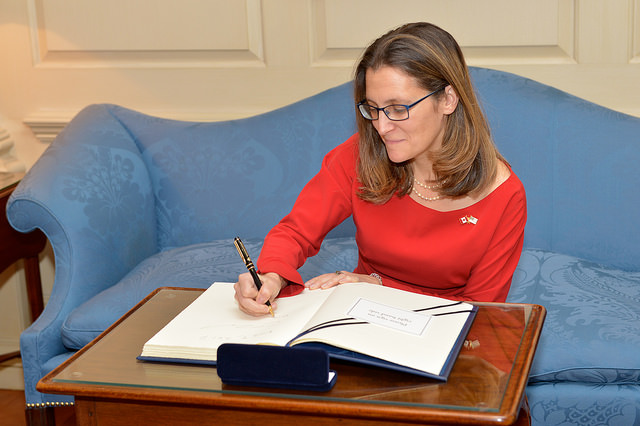A Chinese court has sentenced Canadian Robert Lloyd Schellenberg to death for the crime of drug smuggling, and the Canadian government is taking two tracks in its efforts to save his life.
Even before a regional Chinese court imposed the death sentence, the Trudeau government had asked Chinese authorities to exercise clemency in this case. So far, the response has been anything but favourable. The Chinese have reacted more in resentful and offended anger than in sorrow.
The Canadian government is also taking another tack. It hopes to put pressure on the Chinese by rallying international support for Schellenberg and against the practice of execution
As Global Affairs Minister Chrystia Freeland put it: “Canada’s position when it comes to the death penalty is consistent and very long-standing. We believe it is inhumane and inappropriate. And wherever the death penalty is considered with regard to a Canadian, we speak out against it.”
In this sentiment, the minister can expect to find sympathy and support from member states of the European Union, from most Latin American countries, from Australia and New Zealand, and from South Africa and a number of other African countries which have recently banned executions.
However, Freeland’s statement of principle will not find much resonance immediately in the U.S., where even Democratic party politicians who privately oppose capital punishment fear the political consequences of saying so publicly.
The last time a U.S. presidential candidate stated openly that he was against executions was in 1988, and it did not work out too well. During a televised debate, Democrat Michael Dukakis stated coolly and dispassionately that even if his own wife were brutally murdered, he would be opposed to the state exacting revenge and killing the perpetrator.
That candour, combined with the vicious negative attacks George H.W. Bush’s campaign waged against him, cost Dukakis the election.
Public support for executions in the U.S. and in Asia is high
These days, U.S. death penalty opponents like to point to some hopeful signs in their country. The rate of executions seems to be on the decline, at least somewhat. But a good many U.S. states still impose executions in arbitrary, unfair and cruel ways.
Texas, for instance, has what it calls the “law of parties,” which means a person who is “party” to a criminal offence that results in murder – for instance, the driver of the getaway vehicle – can be condemned to death. There are also significant controversies surrounding the use of the most popular current method of killing prisoners, lethal injection. Over the past couple of years, there has been a horrific series of botched executions using the big needle, which amount to nothing less than torture.
Despite these grisly truths, and the fact that the U.S. is the only country in the Americas that persists in employing the death penalty, American support for executions remains high, at well over 60 per cent, according to polls.
For China, all available public opinion research indicates overwhelming support for the death penalty, especially for violent crimes. And, according to Amnesty International, China is the world champion of executions, although it is impossible to know the exact number of executions carried out annually by Chinese authorities. That information is kept secret, but Amnesty estimates it to be in the thousands.
To date, Freeland has only been able to tout support for Canada’s efforts to save Schellenberg from a number of Western countries, such as Germany.
As yet, she has not been able to convince a single Asian country to take Canada’s side in this effort. That might be because most of those countries — including Japan, Indonesia and the Philippines — still have the death penalty on their books. And most still use it, as does China, against convicted drug dealers.
The cruel fact is that the Canadian argument that the death penalty is barbaric and never justified has little resonance in much of the world. Even the more nuanced argument that, in the case of a crime not involving murder, such as Schellenberg’s, imposing the death penalty is excessive, is likely to fall on deaf ears.
The Chinese can reason: If the U.S. can blithely put to death mentally handicapped people and others only tangentially associated with the act of murder, as well as defendants who had manifestly incompetent defences, why shouldn’t we use capital punishment to deter crimes we consider to be a grave threat to our social well being?
In the final analysis, Canada’s best chance of saving Schellenberg will not likely be moral suasion. Nor will appeals for mercy or pressure from a handful of other countries have much chance of success.
It appears, at this stage, that the most effective way for the Trudeau government to save this Canadian’s life would be to, somehow, find a way to end the extradition proceedings against Huawei executive Meng Wanzhou.
Photo: U.S. Department of State/Flickr
Karl Nerenberg has been a journalist and filmmaker for more than 25 years. He is rabble’s politics reporter.
Help make rabble sustainable. Please consider supporting our work with a monthly donation. Support rabble.ca today for as little as $1 per month!




